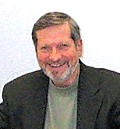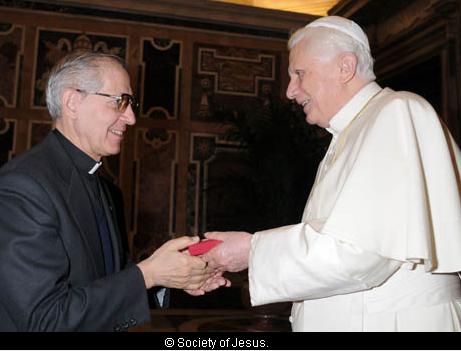 |
Sharing the Experience of the Congregation Saturday, February 23, 2008 << previous entry ....... next entry >>
|
|
|
Dave Schultenover, S.J. is a delegate to the Congregation from the Wisconsin Province, in the US Assistancy. He is a Consultor to the Provincial of the Wisconsin Province and a professor of historical theology at Marquette University. He is the editor in chief of THEOLOGICAL STUDIES, A Jesuit Sponsored Journal of Theology. |
Dear faithful friends of the Society of Jesus, I had delayed my comment on the audience of the delegates to GC35 with Pope Benedict XVI on the morning of February 21, because I was hoping to receive an English translation of the original Italian. Today I learned that we will not receive that until Monday. So I resort to reading the Italian text in L’Osservatore Romano of February 22. First, a comment on Father General Adolfo Nicolás’s brief address to the Pope preceding the papal allocution. Needless to say, Fr. Nicolás’s address was prepared with exceptional care, since these would be his first publicly witnessed words to the Pope on behalf of the Society of Jesus. He, and we, would all want him to start off well! He first expressed gratitude that Benedict received us in audience and for his letter of 10 January sent to the congregation delegates through Fr. Kolvenbach, a letter “rich in content and positive in tone, encouraging and affectionate” and “appreciated by the whole Society of Jesus.” Fr. Nicolás then immediately broached the subject about which most Jesuits, and certainly most Jesuit theologians, are concerned, namely, the tension in the relationship between the pope and the Jesuits when Jesuit theologians, who have an explicit mandate from popes and Jesuit generals down the entire history of the Society to engage in theology not only as apologists of authentic church teaching but also “on the frontiers”—according to the tradition that antedates St. Thomas Aquinas, the tradition that professional theologians must necessarily engage in quaestiones disputatae (disputed questions) for the good of the church. Thus Fr. Nicolás expressed in the first place “gratitude . . . and a strong sense of communion in feeling confirmed in our mission to work at the frontiers where faith and science, faith and justice, and faith and knowledge confront each other, and in the challenging field of serious reflection and responsible theological research . . . grateful to Your Holiness to have been once more encouraged to follow our Ignatian tradition of service right where the Gospel and the Church suffer the greatest challenges, a service that at times also lends itself to the risk of disturbing a peaceful lifestyle, reputation, and security. For us it is a cause of great consolation to note that Your Holiness is more than aware of the dangers to which such a commitment exposes us.” Here, I am quite sure Father Nicolàs was referring not primarily to the trouble that Jesuit theologians can sometimes get into with church officials, but rather to the kind of trouble that Jesuits (and anyone) can get into who take CG32 seriously and teach in the spirit of the gospel, a spirit of “the faith that does justice”—like the six Jesuits and their housekeeper and her daughter who were assassinated by the Salvadoran military at the University of Central America in El Salvador on November 16, 1989. Indeed, a few paragraphs later, Fr. General specifically mentioned that we Jesuits “seek to dedicate ourselves to profound service, to discernment to research . . . even to giving [our] very lives for the Church,” while assuming “the formative responsibility that the Society has in the fields of theology, spirituality, and mission”—a responsibility enjoined on the Society most recently by Benedict’s letter on the convening of GC 35.
I say “masterful,” because Fr. General, while acknowledging the obvious—that occasionally Jesuit theologians get into trouble with the church officials—he implied that they do so, not because they set out to defy or be disobedient, but because the terrain on the frontiers, and in the grey light where most people find themselves with moral and religious problems, is precarious, and slips are inevitable. We regret these slips. But some people, often in the media, and some whose ideology allows them to see reality only in black and white, blow these slips out of proportion and play them up as rifts between “those Jesuits” and “the Holy Father” (see, e.g., http://www.archden.org/dcr//news.php?e=459&s=3&a=9670). In fact, many of the “slips” are not slips at all but attempts to deal with complex problems respectfully, namely, by not giving simplistic answers that only make the problems worse. This was the case, for example, with Jesuit theologian Jacques Dupuis of the Gregorian University, whose 1997 book on interreligious dialogue got denounced to the Vatican Congregation for the Doctrine of the Faith. He was exonerated in 2001, but the lengthy ordeal, many friends believe, shortened his life. He died of a stroke December 28, 2005 (see http://www.nationalcatholicreporter.org/word/word010705.htm). I have gone on long enough for one session, and I have not even come to Benedict’s allocution. Perhaps when it comes out in English, I will return to it. Suffice it this time to say that the pope was most cordial. He warmly invited us to be his “collaborators” “for the defense and propagation of the faith” (quoting our founding document). Benedict would be the last person on earth to think that this “defense and propagation of the faith” is a simple task or that it can or even should be done without tensions and difficulties between theologians and church officials. He implied as much. The tone of his allocution throughout was most gracious and inviting. We left the audience hall with a much lighter step, convinced that this encounter with Pope Benedict XVI has left St. Ignatius smiling. David G. Schultenover, S.J.
|
Send Your Sharing About the Congregation
Back to the G.C. 35 Home Page | Creighton U. Online Ministries Home Page
 Toward
the end of his words to Pope Benedict, Fr. Nicolás masterfully
put into context what can happen with those who “work at the frontiers”:
“It saddens us, Holy Father, when the inevitable deficiencies
and superficialities of some among us are at times used to dramatize
and represent as conflicts and clashes that are often only manifestations
of limits and human imperfections, or inevitable tensions of everyday
life. But all this does not discourage us, nor quell our passion not
only to serve the Church but also, with a deeper sense of our roots,
according to the spirit of the Ignatian tradition, to love the hierarchical
Church and the Holy Father, the Vicar of Christ.”
Toward
the end of his words to Pope Benedict, Fr. Nicolás masterfully
put into context what can happen with those who “work at the frontiers”:
“It saddens us, Holy Father, when the inevitable deficiencies
and superficialities of some among us are at times used to dramatize
and represent as conflicts and clashes that are often only manifestations
of limits and human imperfections, or inevitable tensions of everyday
life. But all this does not discourage us, nor quell our passion not
only to serve the Church but also, with a deeper sense of our roots,
according to the spirit of the Ignatian tradition, to love the hierarchical
Church and the Holy Father, the Vicar of Christ.”